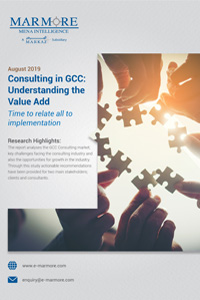Consulting in GCC: Understanding the Value Add
March 19 , 2019
Request Full Report Download Executive Summary Download Executive Summary
Executive Summary
Many stakeholders seek consulting support for programs and the implementation of programs. Consultants' role and value-addition according to the needs of a specific project is supported with proprietary tools and methodologies for identifying key deliverables and program milestones. Consulting can range from specialist technology areas to providing subject matter expertise on policy topics. There are a variety of consulting models that aim to articulate the desired outcomes with respect to client and program performance. Very often, consulting support is needed to bring together the outputs from a range of stakeholders into a coherent and workable plan. Many stakeholders, like public sector companies, government agencies, private sector corporate boards, etc., use external consulting support to help strategically review service areas for focusing on the delivery of institutional plans. Many stakeholders are now increasingly looking upon consultants as a global network of experts to be tapped as external specialists for creating performance partnerships.
FAQ
Key Questions Addressed
- Why stakeholders need to source advice from consultants?
- What are the emergent government consulting needs?
- What are the type of consulting support sought in the GCC?
- Do stakeholders measure perfor
Table of Contents
- Introduction
- Why stakeholders need to source advice from consultants
- How do various stakeholders choose their consultants?
- Native Consultancies in GCC
- Usual types of consulting support sought
- Do stakeholders measure performance impact of consulting assignments?
- Is there a gap between recommendation and implementation: how to measure the gap?
- How to make the relationship more productive and useful
- Conclusion
- Actionable Recommendations
- Appendix
